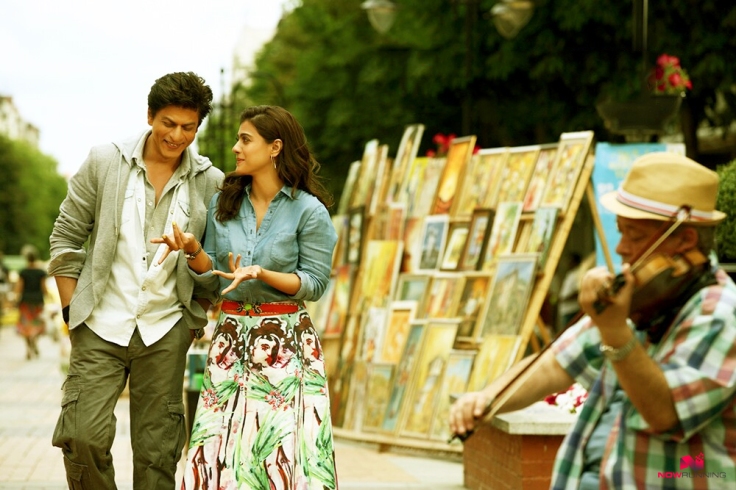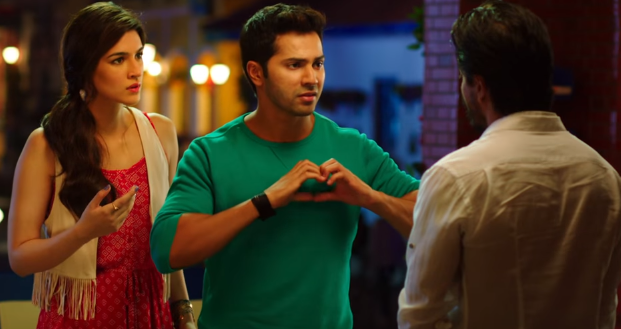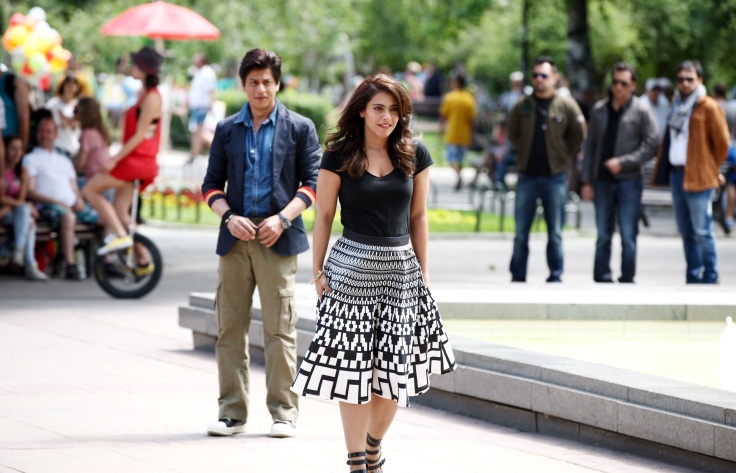By: Samar Khan
Nearly every person that is of South Asian descent that is reading this review is familiar with the iconic pairing of Shah Rukh Khan and Kajol. Their films have transcended generations and continue to capture hearts decades later, with Kuch Kuch Hota Hai and Dilwale Dulhania Le Jayenge fresh in the minds of today’s Bollywood fans as if they were recent blockbusters. It goes without saying that when you announce a spiritual successor to the latter film and literally use the spiritual predecessor in the film’s marketing and official name, the bar is raised high and rightfully so. When you announce that the aforementioned duo of Shah Rukh and Kajol are reuniting for said film, expectations shoot to stratospheric levels. Were this film helmed by a visionary director the likes of the late Yash Chopra, the chances of it becoming a modern classic would increase exponentially. Alas, Bollywood continues to defy all logic by giving us a “masala” style spiritual successor to the revered DDLJ and tops it off by handing the reigns to the man that has come to embody the current day trend of “style over substance:” Rohit Shetty. This, ladies and gentlemen, is the review for Dilwale.
There are three major reasons the aforementioned films starring the pair of Shah Rukh and Kajol have excelled and been able to hold up after nearly three decades: a focus on the pair’s chemistry, a soundtrack that routinely tops every Bollywood fan’s music playlist and a story that is at once both grounded in reality while still providing the ultimate fairy tale romance. Dilwale fails in two of the three aspects; an argument could be made that it fails in all three categories but I won’t be THAT harsh.

The chemistry, as mentioned above, between the pair is obvious. When it comes to all-time on-screen couples in Bollywood (or even Hollywood cinema), there are very few actors that play as well off of one another the way Shah Rukh and Kajol do. Their patented “high five and nose flick” is the stuff of legend, a gesture that has come to embody the playful and loving nature of their relationship that is constantly repeated in all South Asian entertainment mediums. In Dilwale, their chemistry is just perfect once again, with their interactions serving as nearly the entirety of the film’s highlights. It’s a shame though that they had to spend much of the film either quiet or apart from one another, as the scenes lacking the pair engaged in conversation were middling at best. With no disrespect intended towards Varun Dhawan and Kriti Sanon, both of whom turned in commendable performances, they did not play well off of their co-stars and it showed. Dhawan has displayed that he has the acting chops requisite to act alongside the better actors in cinema (his performance alongside the ever fantastic Nawazuddin Siddiqui in Badlapur was award-worthy) but unfortunately, is saddled with a try-hard character that is the butt of and the deliverer of many failed jokes. Sanon has a limited role in comparison to her three more notable co-stars and while she fails to steal scenes the way a certain Deepika Padukone did opposite Shah Rukh in Om Shanti Om, she displayed enough composure to ensure she receives larger roles in the near future.
In complete contrast to your average Hollywood film, the typical Bollywood film is usually judged by how well its soundtrack complements the scenes in between the musical numbers. To call Dilwale’s soundtrack a disappointment would be a massive understatement; it continues the disturbing trend in this latter part of Shah Rukh’s career of participating in films that have relatively poor soundtracks. After nearly two decades of his film’s guaranteeing a soundtrack that would gain immediate additions to one’s playlist, his recent films from Ra.one to Chennai Express have yet to turn out ONE memorable song. One. Think about that for a second. The man whose films have given us musical gems the likes of Tujhe Dekha to ye Jaana Sanam and Kal Ho Na Ho is now part of film’s that have the most awful songs titled One Two Three Four. Outside of a decent romantic song early on that was heavy on the CGI (extremely heavy even for Shetty), the soundtrack was forgettable and not something that will be repeated on the airwaves anytime soon.

Finally, the story. If you’ve watched DDLJ and any of Shetty’s prior films (ala the Golmaal series), you’ll know what to expect. The thinnest of plot devices (seriously, the misunderstanding that makes up the main story could have been solved if Shetty and his writing staff had understood that not everyone has an IQ of 12) are accompanied by the brash, stereotypical action one has come to expect from his films. Overreliance on South Indian humour which is an acquired taste (and a specialty of Shetty’s) while adding extremely juvenile bits of dialogue for his actors leads to a sense of bewilderment. How do you sign that much talent on for a film that was so poorly written? Kabir Bedi and Vinod Khanna are wasted in extended cameos as the fathers of the respective leads, also being victims of the poor writing on display. All in all, the story reeked of someone cashing in on the hype of DDLJ and the acquisition of the two major leads by throwing together all of Shetty’s films into a blender and calling it a day.
What makes analyzing Shetty’s films so maddening is the fact that he has his bright spots that are overwhelmed by the sheer number of lowlights. For example, there is one particular dinner scene between Shah Rukh and Kajol that is “5 minutes” long. Shetty executes to perfection this dinner scene that consists of a short car ride, an equally quick dinner, flirting, walk to an ice cream cart, further flirting and the finalizing of plans for a birthday meet up all in ONE beautiful take. He complements the excellence of that scene with some flawless action scenes that evoke images of Tom Cruise’s Mission Impossible series and Shah Rukh’s own Don series. His decision to cast Johnny Lever as a penniless drunkard lead to some quality hijinks that only the affable Lever is suited to pull off. He squanders all the goodwill he accrues from these glorious scenes with his aforementioned atrociously scripted dialogue and baffling character decisions. From casting Boman Irani as the hilariously awful villain with an equally awful name (King) to wasting the talents of Pankaj Tripathy who was a revelation in Gangs of Wasseypur a few years back, the flaws with the film managed to nearly overwhelm the good decisions he did make.

A funny note regarding everybody’s favourite romance star: From not throwing a punch in any of his classics to beating goons senseless in Dilwale, Shah Rukh Khan has certainly embraced his new role as the action star of incredibly mindless films. Salman Khan gave us the wonderfully poignant gem that was Bajrangi Bhaijaan while his legendary counterpart served up a film that would not be out of place in the former’s filmography.
An additional side note that has to be addressed: In fairness to all parties involved, their failure to shine cannot be attributed to them alone; no, the blame for that falls solely on the dialogue of Yunus Sajawal and the duo of Sajid–Farhad, as well as the direction of Rohit Shetty. His career has consisted of him directing nearly identical films in terms of structure, with the action and cheap humour commonly taking precedence over actual storylines and proper dialogue. It’s just a shame that the first pairing of Shah Rukh Khan and Kajol in half a decade turned out to be part of a Shetty film; in the end, even their chemistry is not enough to overcome the major flaws that plague this film.
After careful consideration, The Film Lawyers have decided to award Dilwale with a grade of D (5.4/10).

Leave a comment